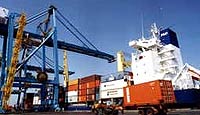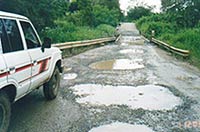 One of the largest exporters from India narrates how he was compelled to airfreight a consignment to meet an order from Kuwait during the Ramadan period demand prior to Id after the consignment was stuck at India's premier port, the Jawaharlal Nehru Port Trust, outside Mumbai. "With profits ranging between 5 and 10 per cent, just one airfreight consignment at Rs45 per kg led to a loss on the entire bulk order," he says. One of the largest exporters from India narrates how he was compelled to airfreight a consignment to meet an order from Kuwait during the Ramadan period demand prior to Id after the consignment was stuck at India's premier port, the Jawaharlal Nehru Port Trust, outside Mumbai. "With profits ranging between 5 and 10 per cent, just one airfreight consignment at Rs45 per kg led to a loss on the entire bulk order," he says. Several orders to the US, EU, Middle East and other centres have been either delayed or even cancelled by buyers, resulting in not just losses running into millions of dollars but also jeopardising the credibility of Indian exporters, besides branding India as an uncertain source. "A buyer with one late or cancelled consignment on hand would hardly be comfortable placing a second order from the same source. It affects the planned sales and profits of thousands of his customers," Says Mehta. With the option to source from countries without such infrastruture uncertainties, major buyers like Wal-Mart, Carrefour, GAP, C&A, JC Penney, may well prefer dealing with other countries than problem infested country like India.  From a buyer's perspective, India has simply too many infrastructure issues to resolve - the number of days required for customs clearances, freight movement from inland to ports, bottlenecks at ports, congestion fee payment and delay charges imposed by the offending ports - are enough to make a buyer think twice about sourcing from India. From a buyer's perspective, India has simply too many infrastructure issues to resolve - the number of days required for customs clearances, freight movement from inland to ports, bottlenecks at ports, congestion fee payment and delay charges imposed by the offending ports - are enough to make a buyer think twice about sourcing from India.
On the other hand, in infrastructure developments China has had a good headstart over India, thanks largely to Deng Xioping's emphasis on rejuvenating the country to showcase it before foreign investors - a policy followed by his successor Zhu Rhonji. As a result of which provincial administrators vied with each other to put up the better road, the better power supply, even better international airports. India is an important sourcing centre for some of the most prestigious overseas buyers. But so are other countries. Thanks to the infrastructure constraints in India, buyers treat India virtually on par with its much smaller rivals and are wary to have any grand plans for the post quota regime.
Adil Raza, country manager, JC Penney Purchasing Corporation, India, says, "We are waiting and watching." According to him in addition to China, JC Penney considers India, Pakistan, Bangladesh and Vietnam to be important markets. However, with the open option to source, from anywhere in the world, without such infrastruture uncertainties, it is not unlikely that major buyers in India like Wal-Mart, Carrefour, GAP, C&A, etc along with JC Penney, too would think on similar lines and prefer either Mexico or Mauritius to India.
also see : The
need for labour reforms
Indian
garments in a brave new world
The
labour conundrum
What
is the Multi Fibre Agreement?
The
China syndrome
|